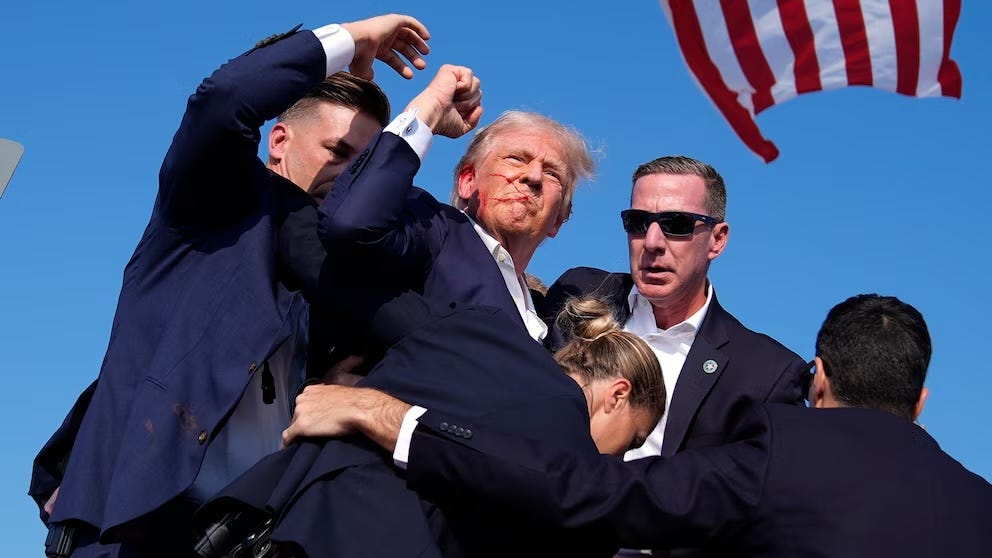On Not Jumping to Conclusions
Okay. There is nothing remotely optimistic to say about an assassination attempt, other than expressing relief that it failed. There is, however, something to be said about the immediate reactions… Within minutes of the near-miss shooting of former President Donald Trump, the commentariat and the social media sphere erupted into a cacophony of remarks like “We should have seen this coming” and “Today’s polarized country has been teetering into violence.” We all heard variants of the same, from friends, family, commentary, politicians. The country has been so fractured and divided, so rent by angry recriminations that each side poses a threat to democracy, that it was easy enough to turn the shooting from an anomaly into an inevitability.
That’s a mistake. Yes, we live in a polarized time. And yes, that polarization isn’t an American phenomenon. It is a global issue in country after country, as peoples everywhere grapple with the efflorescence of individual voices thanks to these magical and sometimes toxic social media tools. And as more of us are able to express to our views and feelings, more of us find many of us to be annoying, idiotic and unacceptable.
But from a purely historical perspective, we’ve simply no idea if today is more or less divided than at other points in the past; past moments of seeming concord existed without the ability of vast numbers of people to express their thoughts about said concord and consensus. We know – now – that in the United States, the halcyon view of the 1950s as a period of consensus and prosperity papered over extraordinary rage and despair, whether of African-Americans unable to participate in the American dream or millions of housewives whose silent plight was finally articulated by Betty Friedan (or by Simone de Beauvoir in France). The story of “we are all in this together” was a good one, but a false one.
Similarly, the “morning in America” mantra of the 1980s was even then scorned by many whilst embraced by some. The Reagan era has taken on – rather remarkably for those who were alive at the time – the rose-tinted hue of rose-tinted hues as a period of calm, prosperity and concord, while at the time it seemed often a fun house mirror of naked consumerist excess combined with government just looking the other way in the face of inequities. The 1990s were likewise a triumphalist period of “we won the Cold War” juxtaposed to a feckless federal government that saw two terms of Bill Clinton squander an opportunity to define a new vision for the United States, ending in the sordid Ken Starr as Torquemada orchestration of an inane political scandal and an even more absurdist impeachment of Clinton for lying about sexual relations with the woman he said he did not have sex with.
As for whether a political assassination is the eruption of a volcano that has been getting ready to blow for some time, well sometimes yes and sometimes no. John Wilkes Booth and the revenge of the Confederacy on Abraham Lincoln in April 1865 was clearly yes. So too were the dual assassinations of Martin Luther King and Robert Kennedy in the spring of the 1968. But the killing of James Garfield in 1881 and the shooting of Reagan in 1981 were both clearly the work of lone and addled gunmen, and not a symptom of a larger cultural or political malaise. So, the easy connect-the-dots that the shooting of Trump is an indictment of our time and a dark sign of where we are…should be not so easy.
History is punctuated by the unexpected, and historians weave stories of how inflection moments changed everything. The assassination of the Archduke Franz Ferdinand in June 1914 has become the prime example: his killing set in motion the gears that led inexorably to the outbreak of what we now call World War I. We know, of course, what happened because of his assassination. We don’t know, of course, what would have happened in its absence. But we cannot, and should not, assume that history would have brighter and better had Gavrilo Princip’s bullets missed their mark, just as we cannot know whether Thomas Crooks, the equally misguided young soul who narrowly missed his mark changed our future for the better, the worse, or not at all.
We should, therefore, be far less quick to think we understand the meaning of what just happened, or to assume that it has much meaning at all. Politics everywhere can be violent, and in most contemporary democracies where the temperature is high and the perceived stakes higher, it perhaps should be remarked how little political violence there is in democracies around the world in 2024, including in the United States. For the moment, the assassination attempt is anomalous, and thankfully so. Yes, the U.S. secret service is inundated with threats, as it has been almost continuously at least since the turn of this millennium and 9/11. In the 2000s, it was the threat of foreign terrorism; now it is the threat of domestic insurgents and the angries. But violence is violence, and the manifold threats of it have been magnitudes of order greater than actual acts.
We, and none of us more than Donald Trump, survived a near miss this week. Maybe, for a moment, we can be grateful for that, and recognize that a near miss is as good as mile, except in horseshoes, and a near miss, given all that has happened in the past and all that is possible in the present and the future, is its own form of good news.



I love The Progress Network. I am on a limited income, so I can’t afford to subscribe to your Substack, but I would like to make a small donation to support your endeavor. A place to send a check?
optimistically you could say it was an attempt